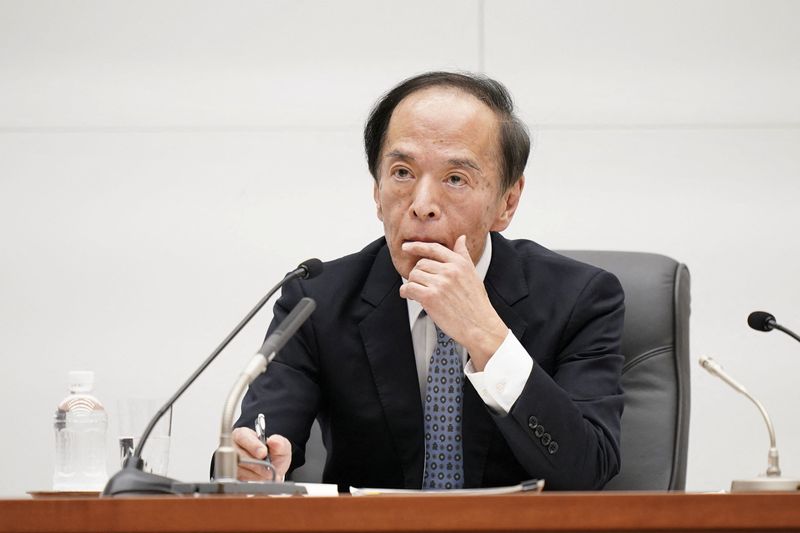(Reuters) – The Bank of Japan maintained ultra-loose monetary settings on Tuesday in a widely expected move, underscoring policymakers’ preference to await more clues on whether wages will rise enough to keep inflation durably around its 2% target.
Following are excerpts from BOJ Governor Kazuo Ueda’s comments at his post-meeting news conference, which was conducted in Japanese, as translated by Reuters:
CORPORATE WAGE POLICY
“The tankan showed labour conditions are tightening and corporate profits are increasing. Labour unions are demanding wage hikes exceeding those of this year. Executives of some big firms are commenting on prospects of higher wages… Our hearings, however, show many companies have yet to decide next year’s wage policy due to high economic uncertainties.”
WAGE-INFLATION CYCLE
“Some smaller firms appear to be struggling to pass on higher raw material and labour costs. The chance of trend inflation accelerating towards our price target is gradually heightening. But we still need to scrutinise whether a positive wage-inflation cycle will fall in place.”
COST- AND DEMAND-DRIVEN INFLATION
“The cost-driven inflation appears to be finally peaking. As for demand-driven inflation, service prices continue to be rising … Our view on the outlook for the latter remains unchanged.”
INFLATION TARGET
“The prospects for (sustainably achieving our price target) are gradually heightening. But in terms of whether the threshold would be met, we’d prefer to look at more data.”
BOJ COMMUNICATION
“As new information comes in between our previous meeting and upcoming meeting, that will be taken into account in deciding the policy. So we can’t rule out the possibility our policy decision comes at a surprise for markets. But we will seek to convey our stance on how we digest the new information in making a judgment.”
IMPACT OF FEDERAL RESERVE’S DECISION
“If the Fed were to shift to a rate cut cycle, the background in which such a decision would be made would have an impact on Japan’s economy such as through currency moves and the chance of a U.S. soft landing. But we won’t decide policy on the thinking that we would need to rush just because the Fed could move three, or six months ahead.”
SIDE-EFFECT OF NEGATIVE RATE POLICY
“The policy does have a certain negative impact on financial institutions’ profits. But when we look at banks’ profits, they are quite strong. I don’t think we’re seeing a decisively negative impact from this policy.”
EXIT STRATEGY
“Obviously, I am always thinking about various scenarios about how we could change policy when certain conditions fall in place. But uncertainty over the outlook is extremely high and we have yet to foresee inflation sustainably and stably achieve our target. As such, it’s hard to show now with high degree of certainty how we can exit (from ultra-loose policy). Once we can foresee (conditions fall in place for achieving the target), we will disclose more information.”
“If we were to exit negative rate, interest rates will rise slightly. But inflation-adjusted real borrowing costs will remain low, so accommodative monetary conditions will be sustained.”
ON PRE-ANNOUNCING THE TIMING OF AN EXIT
“I don’t think the chance is high for us to say abruptly that we will hike rates at a subsequent meeting.”
ON NORMALISING MONETARY POLICY EVEN WHEN REAL WAGES ARE FALLING
“Even if real wages are falling year-on-year, if we expect wages to rise ahead and consumer inflation to continue slowing, that could turn real wages positive. If there are prospects that real wages will turn positive due to these factors, the underlying decline in real wages won’t be an impediment to normalising policy.”
ON WHETHER ENOUGH DATA WILL COME IN JAN POLICY MEETING TO GAUGE IF POSITIVE WAGE-INFLATION CYCLE WILL KICK IN
“It depends on how much data will come in between now and our next meeting in January. We won’t see much new data to come in during the period. But there will be the BOJ’s branch managers’ meeting where we will get data on regional economies. We will also conduct a thorough assessment, including through data already available, in January.”
(Reporting by Leika Kihara; Editing by Rashmi Aich)
